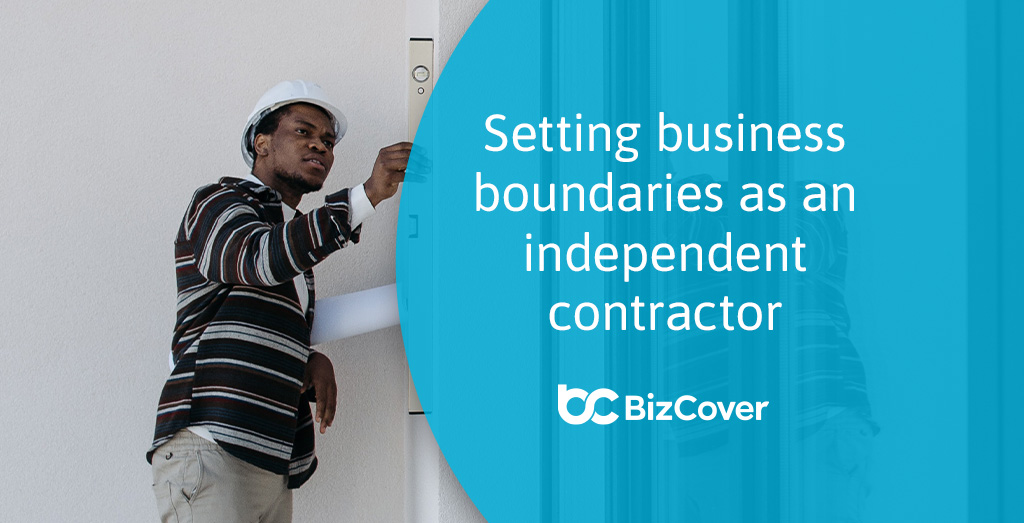Setting business boundaries as an independent contractor
Setting business boundaries is a crucial habit to develop while working for yourself. If you own your own business, you are likely well aware of how difficult it can be to explain your line of work to friends and family. Some people may find it challenging to understand a job where the worker chooses their own hours, picks the projects they work on, and decides where they work each day.
As a freelancer, you should undoubtedly enjoy these privileges. But achieving a satisfactory work-life balance in your work comes from establishing firm boundaries that allow you to carry out your duties as effectively as possible. So, let’s look at three key techniques for establishing sound work boundaries as a freelancer seeking independent contractor tips.
1. Be sincere with your loved ones
When it comes to respecting work time, the individuals closest to you are frequently the main offenders. It’s crucial to let friends and family know when you can’t help them with a last-minute request or a chore, or when they shouldn’t try and call you on the phone to brainstorm summer vacation plans.
Many people believe that because you operate your own business as an independent contractor, scheduling downtime is simple. But this isn’t usually the case, so establish clear office hours. Inform your loved ones about your working hours and be diligent in keeping them.
2. Discuss expectations with customers
It’s crucial to let clients know your working hours and the best way to contact you during those hours, just like you would with friends and family. When it comes to being accessible after hours, you may want to be flexible (there’s nothing wrong with occasionally going above and beyond), but don’t let customers take advantage of you.
Even the best clients will test your ability to do quality work, so exercise caution, especially when it comes to the scope of jobs. You should never try to overcharge your clients, but you do need to ensure that you get paid fairly for the work you do and the time you spend doing it.
3. Invest in yourself
It’s not unusual to find yourself working additional hours frequently when you own your own business. It’s easy to get side-tracked by finishing that last-minute project or checking email regularly throughout the evening. However, resist the urge to let work time encroach on family or personal time. Make it a point to emotionally and physically disconnect from work at the end of the day. Turn off your computer and take some time to unwind.
As you establish boundaries, pay attention to what your friends, family, and clients have to say – because they’ll let you know if something isn’t working. Use their feedback as an opportunity to review, assess, and if needed, modify, your work hours and habits.
Adaptability and understanding that every situation, client, and project will be unique, is vital. Setting business boundaries can help you to stay productive at work and with a little planning maximise your spare time away from the office. And while on the topic of investing in yourself, independent contractors can benefit from independent contractor insurance reduce their risks while on the job.
4. Ethical limits and client contractor boundaries
If you want to keep hearing from recruiters about new project opportunities and getting call backs from clients, maintaining your integrity must be a key focus. There are numerous stories of contractors who continued to little by little push their ethical boundaries until, finally, they found themselves in an unthinkable dilemma with no way out.
Lying about your skills to a potential client or employer may seem like a small white lie, but it can spiral out of control before you know it. Unfortunately, procurement managers can see this often from independent contractors. Perhaps you extend a project to meet the requirements of the job description, or say that you have extensive experience in a certain area even though you actually only have basic experience.
If this is how you routinely operate as an independent contractor, it may not be too long before your minor exaggerations come back to bite you in the worst possible ways.
When you eventually secure a contract and cannot fulfil it, employers will remember it. Both the client and their recruitment agency (if you went through one) will freeze you out from future projects.
When you operate as an independent contractor, small fibs can put you on a slippery slope to losing valuable work. Billing for an extra hour or two when you weren’t actually working; sharing customer information with close friends (you know they won’t tell anyone), and falsifying job details to get a better rate all seem insignificant at the time. But you can be that they will sooner or late catch up with you.
Remember – as an independent contractor you are only as good as your last job. So take great care in upholding your outstanding reputation. Don’t sully it at any cost.
Ensure the longevity of your independent contractor business by protecting it with business insurance*. At BizCover we offer insurance solutions for all kinds of businesses, giving you peace of mind coverage with no dramas. Get a quote today.
© 2022 BizCover Pty Limited, all rights reserved.
ABN 68 127 707 975; AFSL 501769
This information is general only and does not take into account your objectives, financial situation or needs. It should not be relied upon as advice. As with any insurance, cover will be subject to the terms, conditions and exclusions contained in the policy wording. © 2025 BizCover Limited.





